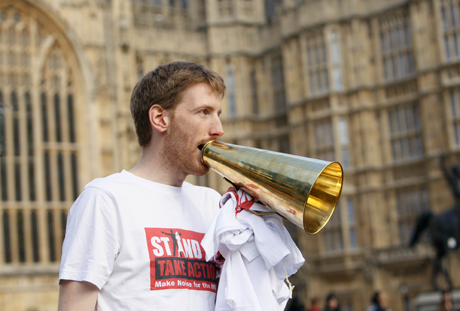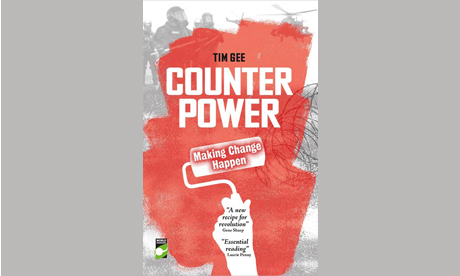Interview: Hackney author Tim Gee on his new book, Counterpower

Tim Gee, one of a number of protestors pressing world leaders to deliver the Millennium Development Goals last year (2010). Photograph: © Justin Tallis
Earlier this month protesters tried to occupy London’s Stock Exchange following a sit-in on Westminster Bridge. After Britain’s biggest riots for a generation and increasing anger over government cuts, Hackney author Tim Gee says our democracy needs a new direction.
Gee’s new book, Counterpower, catalogues the history of civil disobedience from the French Revolution to modern day.
He has been a prolific activist for ten years and was part of Climate Camp from its inception. He superglued himself to Royal Bank of Scotland last year, to protest against their funding of fossil fuel extraction, in his words “the world’s biggest environmental threat.”
For Gee, Counterpower is more a manual for action than an academic text. He says he wanted to show why some movements succeed and some movements fail.
“I wanted to write for the people that I was campaigning with about what had happened before ,but I also wanted to write something for the many people I meet who believe that campaigning doesn’t make a difference.
“I think one of the things that comes out really strongly is every successful movement has been told that they won’t make a difference, and obviously every movement does to some extent.”
He argues civil disobedience- or Counterpower with a capital ‘C’ as he terms it throughout the book- has always been an essential part of democracy: “We’re ruled by the people and there’s lots of ways people can rule other than putting a piece of paper in a box.” For him, Counterpower has more importance than ever as political parties and governments increasingly close down dialogue with the electorate and their own parties.
On the Iraq war, Gee says: “We won the argument but lost the campaign because we only used one kind of Counterpower- what I call ‘idea Counterpower’.” If the million people who protested had instead staged a sit-in, he says, the government might have taken notice.
Gee sees movements like the sit-in on Westiminster Bridge and Occupy London Stock Exchange as the dawn of a new age in Counterpower: “The Westminster sit-in wasn’t just a straightforward rally. People sat down and they asked each other ‘What are we going to do to escalate this? How are we going to work with each other against the government?’
And they decided they were going to occupy London Stock Exchange. “I think it’s true that there is a bigger movement towards civil disobedience than I’ve certainly ever seen in the time I’ve been involved. It’s certainly bigger than Climate Camp,” says Gee,
The riots, he argues, were “implicitly political” as they show how many people felt they had nothing to lose. At the heart of them, he says, was anger at police brutality and spending cuts: “I recently got hold of a cross-European study of riots matched against public spending cuts, and it was quite clear from the results that where there are big public spending cuts there are also riots, and the bigger the cuts, the bigger the riots.
“That’s why I think you have to recognise they are implicitly political, just not very constructive methods.”
He sees the aftermath of the riots as a time for people to try to change the current system, which concentrates power with a small political elite. Counterpower, he says, is part of the solution: “Society needs to be organised, and in order to be reorganised it has to be disorganised. The question is, where we go from here?”
The danger he sees is that the government will use the riots to justify further infringements of people’s civil liberties, as in Naomi Klein’s Shock Doctrine theory.
As an example, he refers to some high profile and arguably disproportionate prison sentences handed out to riot-offenders. He adds though, that people can hardly be surprised: “I mean, of course people complain about that, but just complaining about it isn’t enough. If we want society to go in a different direction we’ve got to do something about it.”
Tim Gee will make a number of appearances to talk about Counterpower, including one at Pogo Café on Wednesday 7 December.
Further information about Counterpower from New Internationalist.

